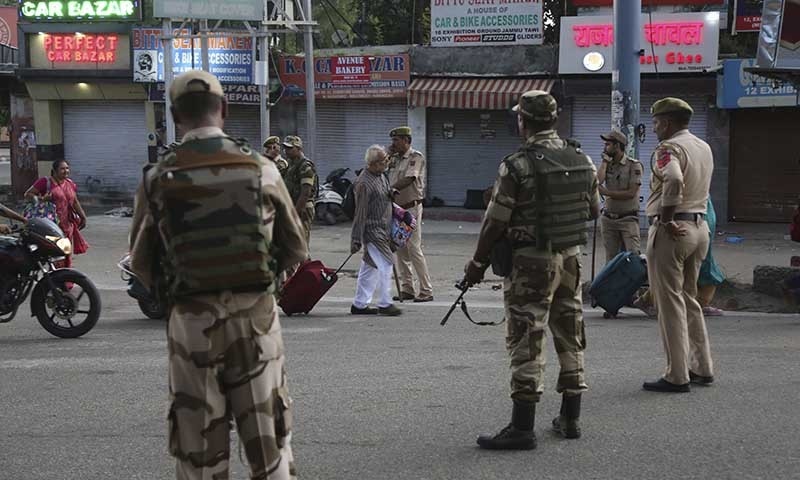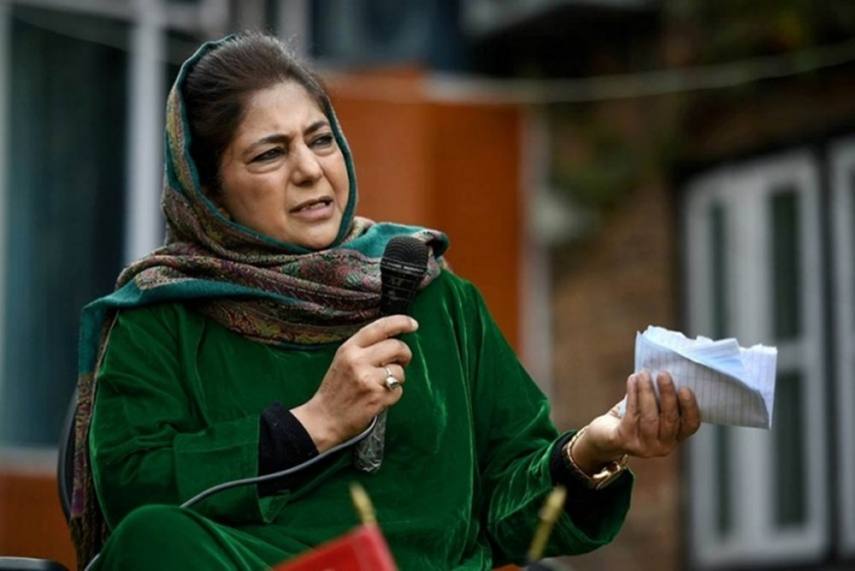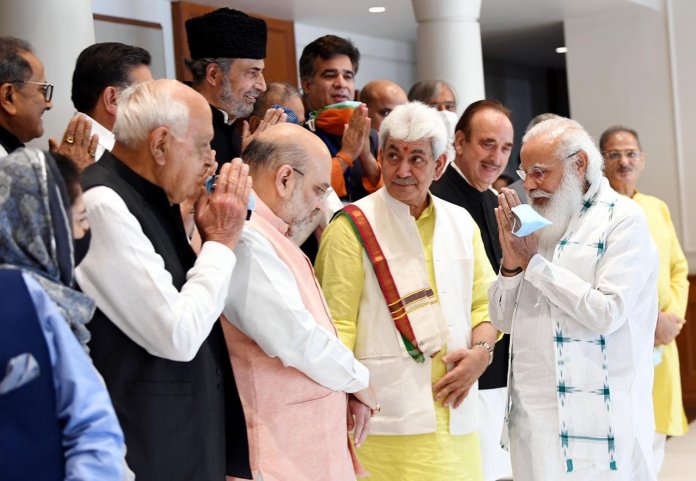Pakistan has rejected political maps of India recently issued by the Indian government. “The political maps of India, issued by the Indian Home Ministry on 2 November 2019, displaying Jammu and Kashmir region and seeking to depict parts of Gilgit-Baltistan and Azad Jammu and Kashmir within the territorial jurisdiction of India, are incorrect, legally untenable, void and in complete violation of the relevant United Nations Security Council Resolutions,” read the Pakistan Foreign Office statement. “Pakistan rejects these political maps, which are incompatible with the United Nations’ maps.” The statement said that “no step by India can change the ‘disputed’ status of Jammu and Kashmir recognised by the United Nations.” Such actions by India could never affect Kashmiris’ struggle for their rights. Such measures by the Government of India cannot prejudice the inalienable right to self-determination of the people of Indian occupied Jammu and Kashmir.
The illegal and unilateral changes effected by India are in no way an “internal matter” as the Jammu and Kashmir dispute remains on the agenda of the Security Council. Pakistan and China have vehemently rejected the formal revocation of the constitutional autonomy of India-Occupied Kashmir (IOK) and splitting the disputed of state into two federal territories in a bid to firm its grip over the territory.
Businesses were shut in the Muslim-majority area and the streets largely deserted in its main city Srinagar as new administrators were sworn into office in the biggest restructuring of the 173 year-old former princely kingdom. The symbolic change is the absence of Kashmir’s own flag and constitution, which were eliminated as part of the region’s new status. Indian authorities have also changed the name of the state-run radio station Radio Kashmir Srinagar to All India Radio Srinagar. But the most contentious point for many people is the threat of land grabs by Indians outside the region with the formal abrogation of a clause in the Indian Constitution that safeguarded Kashmiris’ exclusive right to land ownership.
“Everything changes on Thursday [October 31]. From a state, we are reduced to a municipality,” said a retired Kashmiri judge, Hasnain Masoodi, a member of India’s Parliament. “The entire exercise is unconstitutional. The mode and methodology have been undemocratic. People were humiliated and never consulted.” Masoodi represents the National Conference, a powerful pro-India Kashmiri political group whose leaders have been detained.
Contrary to the false projection by the Indian authorities, the purpose of these illegal changes in Indian occupied Jammu and Kashmir is neither development of the region nor welfare of the Kashmiri people. The real motive is to alter the demographic structure of the Muslim majority state in pursuance of the extremist “Hindutva” ideology. Indian has formally initiated colonial rule, foreign occupation and alien domination in IOK. Tens of thousands of police and paramilitary soldiers fanned out across the occupied valley, patrolling the streets and manning checkpoints, as the new legislation went into effect on October 30-31 midnight. Angry protesters took to a main thoroughfare in Muzaffarabad, the main city of Azad Kashmir, on October 31 to condemn the bifurcation of the Occupied Kashmir into two federal territories. “Down with India” and “We want freedom [for our brothers in IOK]”, they chanted.
The Jammu and Kashmir Reorganization Act which was presented in the parliament by the Indian government on August 5 became effective on October 31, 2019. It divides the IOK into two union territories consisting of Ladakh and Jammu and Kashmir (J&K). From October 31, Jammu and Kashmir (J&K) stands fully integrated into the Indian Union at least notionally. And India’s tricolour flag is hoisted in Srinagar to nominally mark the final absorption of territories into India. Status of IOK has been reduced from a province to two municipalities. Lieutenant Governors of J&K and Ladakh, Girish Chandra Murmu and Radha Krishna Mathur respectively have assumed their offices.

These measures have been thrust upon the people by turning the region into a prison by over 900,000 Indian security forces one soldier for less than 100 citizens. More than 8 million Kashmiri people have been denied their fundamental right to communicate with the outside world. Curfew remains imposed and movement of people restricted. All this is, however, only a paper exercise, the recently held local J&K local body elections were fully boycotted in the Valley where the voter turnout was negligible.
The real motive is to alter the demographic structure of the Muslim majority in the J&K. The international community must take notice that transfer of civilian population from outside into J&K is in grave violation of international laws, particularly the Fourth Geneva Convention.
The BJP government is now focusing on implementing “the Jammu and Kashmir Reorganization Act” by allowing Indian nationals to buy property, cast their vote and permanently settle in J&K. Under the Act, delimitation of electoral constituencies will also take place which will benefit the Hindu nationalist BJP. To win over the sympathies of around 450,000 government employees, a salary hike plan has been rolled out. Through such gimmicks, Modi hopes to further strengthen its hold over the Valley.
Pakistan has rejected the “bifurcation” of IOK. Changing of status quo in IOK is in complete violation of the UN Security Council resolutions and bilateral agreements between India and Pakistan, especially the Simla Agreement. The IOK is an internationally recognized disputed territory and no step by the government of India can change this status. These changes are illegal and void as per the relevant UNSC Resolutions, and do not affect the right to self-determination of the people of Occupied Jammu & Kashmir.
The illegal and unilateral changes effected by India are in no way an “internal matter” as the Jammu and Kashmir dispute remains on the agenda of the Security Council. Further more, contrary to the false projection by the Indian authorities, the purpose of these illegal changes in Indian occupied Jammu and Kashmir is neither development of the region nor welfare of the Kashmiri people. The people of Indian occupied Jammu and Kashmir will never accept the illegal and forceful occupation. The illegal unilateral actions taken by India has only further aggravated the human rights situation in the IOJ&K and it threatens to destabilize the peace, security and stability of the South Asian region as well as the World.
India needs to stop brutalizing the innocent Kashmiris who are suffering under its illegal occupation for the last seven decades. India should immediately withdraw its military forces from the region, remove draconian laws, restore basic human rights of the people, free all detainees, lift all restrictions on the free movement and communications, allow unimpeded and full access to the UN and other international human rights observers, including independent foreign media. It is imperative that India, forthwith implements the UN Security Council Resolutions on the right of Kashmiris to self-determination.
It doesn’t matter to the Modi regime whether the Valley’s eight million beleaguered people hate the Indian military and its occupation, because the regime considers land and not people as a source of its power. “The unfulfilled dream of integrating Jammu and Kashmir has been accomplished,” said Home Minister Amit Shah, who is leading the political strategy to deal with Kashmir.
The growing confidence of the Modi regime would ultimately turn out to be an illusion. UNSC, UNGA and Human Rights Council will ultimately pass resolutions against India, further building on two consecutive reports by the Office of the UN High Commissioner for Human Rights (OHCHR). Even the International Court of Justice (ICJ) may pass a non-binding but biting opinion.
India’s over consolidation of power in J&K is backed by BJP’s two-thirds majority in the lower house. Indian opposition parties and HR organizations have almost given a walkover to Modi’s Kashmir policy. Kashmiris are further handicapped because they are not getting any worthwhile support from elsewhere and Pakistan’s moral, diplomatic and political support has hit a stalemate mark.
Modi thinks he could disregard the limited support by the international community and continue with his ethnic cleansing plan with impunity. The new governor in Srinagar has stated that state elections in J&K will be held after the delimitation commission is through with its work. This means there would certainly be a BJP led government in IOK as pro-liberation political parties would stand further marginalised.
Unfortunately, Pakistan’s cold footed policy of dealing with India’s occupation of J&K is providing enough space to New Delhi to further consolidate its power there. Ironically, for Pakistan, AJK, IOK and the Kashmiri diaspora October 31 adds to the long list of commemorative days to mark various stages of Indian hegemonic campaign. Will IOK ever see the light of freedom or will its beleaguered population just be engaged by their outside supporters by celebrating such days?

Former chief minister Mehbooba Mufti has said that the federal government must engage with Kashmiris before they become even more alienated. Mehbooba is one of the scores of politicians in detention to prevent larger protests from erupting. “GOI (government of India) has left Kashmiris in the lurch and shown disregard for their rights. But if you consider them as your own, reach out and engage with them before it’s too late,” she said in a Twitter post which is being handled by her daughter Iltija.
Despite additional troops and unending restrictions, protests have been erupting since the August 5 announcement of the change of status. Modi’s decision to change the IOK’s status and tighten its grip on the region has stoked anger and resentment. At least 20 incidents of stone-pelting were reported from Srinagar and other parts of the Kashmir Valley on October 30, a state police official said.
The Communist Party of India Marxist (CPI-M) in a statement issued in New Delhi termed as shameful the decision to formally declare separation of Ladakh from Jammu and Kashmir. It said the territory was divided without taking the opinion of its citizens and reiterated its strong opposition to the abrogation of Article 370.
Reacting to the development, China said the bifurcation of Indian Occupied Kashmir (IOK) into two Union territories was unlawful, void and ineffective and will not change the fact that the area was under its actual control. Speaking to the media in Beijing, China’s foreign ministry spokesman Geng Shuang said Kashmir was a dispute left from history that should be peacefully resolved. “The Indian government officially announced the establishment of so-called Jammu Kashmir territory and Ladakh Union territory, which included some of China’s territory into its administrative jurisdiction,” Geng said. “China deplores and firmly opposed that. India unilaterally changes its domestic law and administrative divisions, challenging China’s sovereignty and interests. This is awful and void, and this is not effective in any way and will not change the fact that the area is under China’s actual control,” he added.
Reacting to China’s objection, India said the reorganisation was entirely its internal affair and it did not expect other countries to comment on such matters. India claimed that China continues to be in occupation of a large tract of area in the so-called Union Territories of IOK and Ladakh. “It has also illegally acquired Indian territories from Azad Kashmir under the so-called China-Pakistan Boundary Agreement of 1963,” Indian ministry of external affairs spokesperson Raveesh Kumar said during a conference.
The people of Indian occupied Jammu and Kashmir will never accept the illegal and forceful occupation. India should immediately withdraw its military forces from the region, remove draconian laws, restore basic human rights of the people, free all detainees, lift all restrictions on the free movement and communications, allow unimpeded and full access to the UN and other international human rights observers, including independent foreign media.
Ultimately, only justice, and not the brute force, would bring peace to Kashmir. Pakistan would continue its support for the legitimate struggle of the people of Indian occupied Jammu and Kashmir for exercising their right to self-determination in accordance with the relevant UN Security Council Resolutions.




